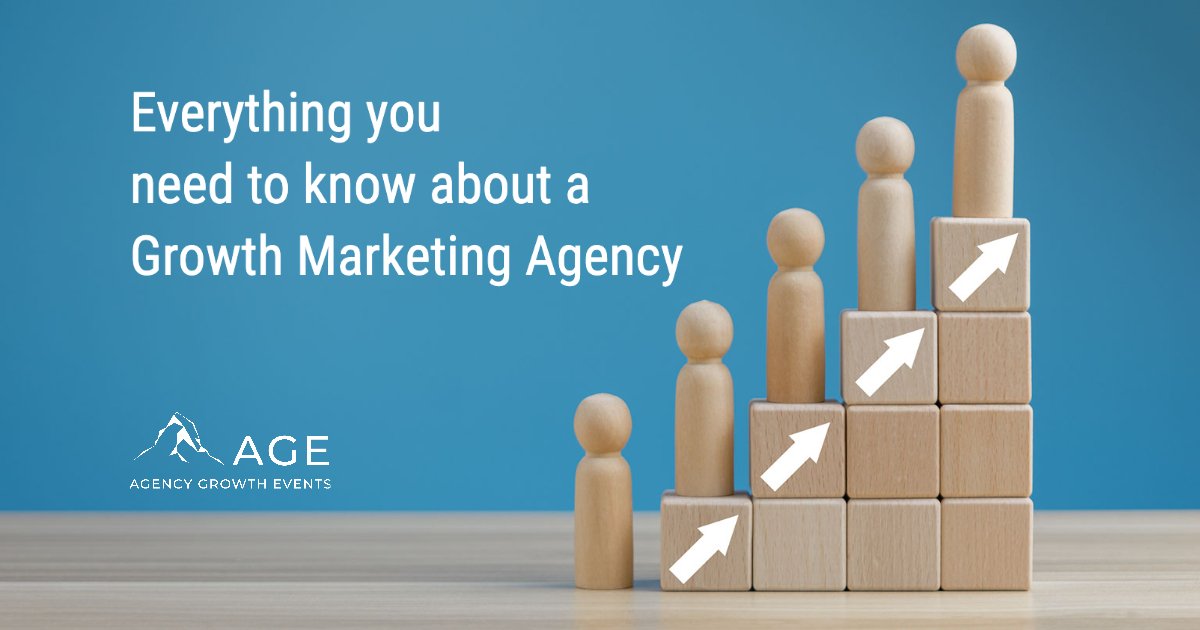Everything you need to know about a Growth Marketing Agency
So, you want to learn about Growth Marketing Agencies. How to find and, let alone choose one? What to expect from one? What sets them apart from traditional marketing agencies? And perhaps you'd like to see some growth marketing examples in action too.
Whether you're a brand looking for a growth marketing agency or a growth marketer looking to learn more, you came to the right place. Here's everything you need to know about Growth Marketing Agencies in an under 10-minute read.
Here's what we're going to cover:
What is Growth Marketing?
What are the most common Growth KPIs?
What is a Growth Marketing agency?
What are the core services of a Growth Marketing Agency?
How do Successful Brands Choose the Right Growth Marketing Agency?
How to choose Growth Marketing Agencies for Startups?
Growth Marketing Examples
How do I start a growth marketing agency?
What is Growth Marketing?
Growth Marketing is creating and implementing data-driven strategies focusing on growing a business. It involves a holistic approach to achieving growth by combining sales and marketing tactics to create an overarching business strategy that drives measurable results. It is much more aligned with your business success than marketing alone.
This means it goes beyond traditional performance marketing services delivered in isolation by a digital agency, like paid media, conversion rate optimization, web design, ui desing, social ads, and search engine optimization strategy.
And we need to include a word of caution on growth hacking for all growth marketers that believe in data-driven growth. Although it might just be a terminology mix-up, the customer expectation from a growth hacking agency or growth hackers would be a quick win with minimal effort. More often than not, this is unsustainable.
The rapid growth of a new customer base with little more than ad spend or viral marketing might not always lead to long-term growth, as customers might start to churn, and organic traffic and customer engagement are not sustained.
📌 If you are looking for more tips about your agency’s growth, check our Growth Tips Category.
What are the most common Growth KPIs?
Growth KPIs (Key Performance Indicators) are metrics used to measure growth in a business. They provide a way for companies to track progress toward their growth goals and determine the success of their strategies. If you want to implement a data-driven approach, you must implement a good mix of these KPIs in your digital strategy.
Here's a non-exhaustive list of metrics your growth marketing team should use during their data analysis :
Revenue Growth
Simply put, Revenue Growth is the positive change in a company's total revenue over a given period, resulting from increased prices or quantity of products and services sold. The key for your growth team is attributing that growth to strategy, tactics, and marketing budget items.
Conversion Rate
In a broad sense, conversion rate is a metric used to measure the number of users that complete an action divided by the total number of users who took that action. But for growth marketing terminology, we'll refer to the number of leads who become paying customers.
Customer Acquisition Cost (CAC)
Customer Acquisition Cost (CAC) is the total amount spent to acquire new users, including the cost of marketing activities, sales, and other related expenses. It is calculated by dividing all the costs associated with acquiring customers over a period of time by the number of customers acquired during that period. CAC is an important metric to track, as it helps the marketing team determine the efficiency of their marketing and sales efforts.
Customer Lifetime Value (CLV)
Customer Lifetime Value (CLV) is a metric used to measure the long-term value of a customer relationship. This metric helps businesses understand how much they should be willing to spend on acquiring and retaining customers.
Customer Lifetime Value to CAC ratio (LTV/CAC)
Customer Lifetime Value to CAC ratio (LTV/CAC) is an essential metric for any growth marketing team to measure the long-term profitability of a customer relationship. The ratio divides the estimated Customer Lifetime Value (CLV) by the Customer Acquisition Cost (CAC). A high LTV/CAC ratio indicates that a company's marketing efforts have been successful and that the business is getting more value out of each customer than it spends on acquiring them.
A good industry average is somewhere between 3:1 and 4:1. If you're beating this by a mile, you might be understanding in your user acquisition marketing.
Return on Ads Spend (ROAS)
Return on Ads Spend (ROAS) is a metric used to measure the efficiency of an advertising campaign by dividing the total revenue generated by the amount spent on advertising. It is a key performance indicator for a growth marketer or any growth marketing consultant that helps them determine their campaigns' success and whether they need to adjust their strategy or budgeting decisions to get a better return on their ad spend.
A Nielsen study suggests the industry standard is 2.87:1. Which means businesses make $2.87 for every dollar spent. Now you know what number to beat.
Average Order Value (AOV)
Average Order Value (AOV) is a metric used to measure the average size of each order placed by customers over a given period of time. It is calculated by dividing total revenue from sales by the number of orders. AOV helps a growth marketer understand customer spending habits, better segment their data and offers, and can be used to optimize marketing campaigns.
Retention/Churn rate
Retention rate is a metric used to measure the percentage of customers that remain loyal over a period of time and continue to purchase products or services from a business. It is an important KPI for a growth marketer as it helps them understand how successful their efforts are in building customer loyalty and if any changes need to be made.
On the other hand, churn rate is a metric used to measure the rate at which customers stop using a product or service. It is calculated by dividing the number of customers that have stopped using the product or service over a given period of time by the total number of active customers during that same period. A high churn rate would indicate that the company is not doing enough to keep customers engaged, and they need to start addressing product or service-related problems.
Net Promoter Score (NPS)
Net Promoter Score (NPS) is a metric used to measure the customer loyalty and satisfaction of a business' customers by asking them to rate how likely they are to recommend the brand on a scale from 0-10. It helps growth marketers understand if their customer retention efforts are successful and if any changes need to be made to improve customer loyalty. It also helps businesses measure customer satisfaction and the effectiveness of their marketing campaigns.
It is notoriously low for some industries by nature, so you need to ensure you don't benchmark yourself with irrelevant sectors. It is best to track the % change in NPS rather than the absolute number.
Inbound inquiries
Inbound marketing inquiries are leads that come directly to a business or website from organic search engine results, referral links, marketing campaigns, and other direct channels.
They are valuable because they are generally qualified leads, representing interested customers who actively seek out the company's offerings, making them more likely to convert into paying customers.
Working with the right agency that can create a content strategy tailored to your business will give you a competitive edge in inbound leads and surely drive revenue.
What is a growth marketing agency?
A growth marketing agency is a digital marketing agency that specializes in helping businesses drive growth and expand through a mixture of marketing strategies. They might not deliver all the tactics of the growth strategy they set themselves, but they will give you a holistic overview of all the tactics and digital solutions deployed. You don't need exposure to all the multiple specialists they might use. You just focus on your business growth and let them handle the rest.
They will typically focus on driving measurable results that align with your business's growth, revenue, retention, and basket size. They will tie them to marketing deliverables such as increasing website traffic and conversion rates, generating leads, and more.
They differ from traditional digital marketing agencies by not taking solo projects like setting up mobile campaigns, running paid advertising, or fixing technical SEO and link building. If you want a dedicated growth team focusing on scalable growth, you must hire a growth agency with a broad mandate that might span from sales enablement to making marketing decisions for you.
A classic way of working would be to categorize the work into growth sprints and focus on only a number of specific problems at a time. This will allow your growth marketing agency to test, analyze and make data-driven decisions.
How do I start a growth marketing agency?
Starting a growth marketing agency requires careful planning and execution. It would help if you defined what will set you apart from all other agencies and create your core values accordingly. It is so much more than just a naming convention or a branding exercise.
Here are some steps you can take to get started:
Define your niche: Decide on the type of clients you want to work with and what services you will offer. This can be company size (startups, scale-ups, or others), geography, or industry sector.
Build a growth team: Hire talented individuals who share your vision and have the skills to deliver high-quality services. Remember, you need a diverse group to set up your growth shop team!
Create a business plan: Develop a detailed plan that outlines your goals, target market, pricing structure, revenue streams, and marketing strategy. This should also include what you will not do. Perhaps you will decline isolated web design projects, email marketing assignments, or just plain social ads.
Establish partnerships: Build relationships with other businesses and agencies to help you deliver for your customers. You can be very good at conversion rate optimization but not the best at content marketing; solve this by partnering up. You can also become a google partner or get listed in some agency directories.
Deliver results, not activities: Focus on delivering measurable results for your clients by implementing effective growth strategies tailored to their specific needs. Do not resort to short-term growth hacking tactics; deliver a complete marketing strategy and prove your worth with results.
Even with the tips above, starting a growth marketing agency is not easy. Be prepared to invest time and resources to build a strong business foundation. Check out the Agency Growth Book and its launch event sessions to get insights from the best agency coaches.
What are the core services of a Growth Marketing Agency?
A growth marketing agency can offer a wide range of services to help businesses grow. The three core services most agencies offer are strategy, marketing, and sales.
Strategy involves developing a plan for how to achieve the desired growth goals. This includes setting targets, researching the market, and identifying opportunities and threats. You can expect this to include forays into business models, products, and even corporate innovation.
Marketing involves creating and executing campaigns to raise the brand awareness of the business and generate leads. This may include all aspects of digital marketing, such as inbound marketing, online advertising, social media marketing, email marketing, and content marketing.
Sales involve converting leads into customers through effective selling techniques. This may include general sales enablement, developing and fine-tuning sales funnels, making cold calls, and getting better at closing deals.
Growth marketing agencies can provide a valuable service for businesses that want to achieve sustainable growth. By offering these three core services, they can help businesses develop a comprehensive plan for success.
Read more about the services that growth agencies can offer here:
📌 Three Core Growth Agency Services: Strategy, Marketing, and Sales
How do Successful Brands Choose the Right Growth Marketing Agency?
Choosing the right growth marketing agency can be a crucial decision for any successful brand. There are several factors to consider when selecting an agency that can help you achieve your business goals.
You can follow five steps approach to understand which growth agency is most appropriate for your brand.
Defining your needs is crucial in determining whether or not to work with a growth marketing agency. You might not be ready to work this way. In this case, appoint a digital marketing agency and own your growth strategies yourself.
Looking for a growth agency specializing in your industry or market is important for the best results.
Asking for and talking to references can provide valuable insight into the agency's past performance and client satisfaction.
Prioritizing culture fit above anything else ensures that the agency will align with your business values and goals.
Managing the growth agency effectively can help ensure a successful partnership and achieve desired outcomes.
Read more about how to choose the right growth marketing agency for your business:
📌 How do Successful Brands Choose the Right Growth Marketing Agency?
How to choose Growth Marketing Agencies for Startups?
Choosing the right growth marketing agency for a startup can be a daunting task for founders who don't have a marketing background, but there are several key factors to keep in mind.
Consider the agency's experience working with startups. Startups have unique needs and challenges, so it's essential to find an agency that understands these and has a proven track record of success in this area.
Then, look for an agency that specializes in your industry or market. This will ensure that they deeply understand your target audience and can develop strategies that resonate with them. Assess their approach and methodology. Look for an agency with a straightforward process for developing and executing digital marketing campaigns that align with your business goals.
Optimize for long-term growth, and do not fall prey to false growth hacking promises. If anybody could grow your business with just some magic email marketing trick or viral inbound marketing hack, they would do it for themselves first!
Don't forget to prioritize communication and transparency. A great agency should keep you informed every step of the way and be responsive to your questions and concerns.
By considering these factors when choosing a growth marketing agency for your startup, you can find a partner who can help you achieve sustainable growth and success.
Growth Marketing Strategy Examples
Here are some growth marketing examples from our feed.
📌 The Story Behind Logsign's 340% Increase in Google Ad CTR
📌 Energised: Ocelott Grows EasyFishoil's Sales 400%
📌 How Ocelott Took KLM's Campaign Engagement Sky High
The one paragraph summary
Growth marketing is a powerful tool to help brands achieve data-driven growth and long-term success. Choosing the right growth marketing agency for your needs is critical to achieving the desired outcomes, as it's essential to look for an agency specializing in your industry or market with experience working with startups. Stay away from growth hacking promises, master your growth KPIs, let the agency present its strategy, query it, adopt it together, and execute it perfectly.
With these tips in mind, you should be able to find the perfect partner who will help take your brand to new heights!













